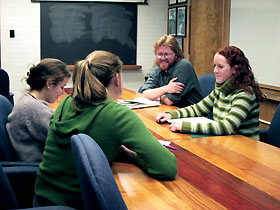|
This is an archived article.
For the latest news, go to the Advance Homepage
For more archives, go to the Advance Archive/Search Page. |
||
|
Combined Degree Prepares Students
Whether it's protecting a local watershed or ensuring the survival of a migratory songbird in the Dominican Republic, the need to address the threats to the planet's biological diversity has become more pressing than ever, scientists say.
Graduates of a new degree program in the ecology and evolutionary biology department will be well prepared to tackle these problems. The program combines a bachelor's and a master's degree in biodiversity and conservation biology. It offers students a foundation in the principles of conservation science and the related social, political, and economic issues. Launched last year, the five-year program prepares students for careers that require knowledge of ecology, evolution, systematics, natural history, and public policy to address problems in biodiversity management and conservation. It is one of a handful of programs in the nation that combine education in biodiversity and conservation biology with public policy perspectives. Eric Schultz, an associate professor of ecology and evolutionary biology, says students trained in the program will be better equipped to meet the needs of the job market. "Over the last decade, faculty in our department who have interacted with conservation organizations learned that there is a need for people with slightly more advanced training than what our bachelor's degree offered," Schultz says. "With this combined degree in hand, students will be better able to handle a variety of positions with conservation organizations and state and federal governments. There is an urgent need for people with training and expertise in conservation biology and biodiversity." The bachelor's degree in ecology and evolutionary biology comprises the first four years of the program, but master's-level courses may be taken during the junior and senior years. Students must complete an internship and at least four credits of research at the master's level. The internship is designed to give students experience in the practical applications of biodiversity and/or conservation. Host agencies in the United States or abroad include the National Audubon Society, the Nature Conservancy, the U.S. Forest Service, Wildlife International, and natural history museums. Students are encouraged to conduct their research in conjunction with the internship component of their degree program. A formal thesis is not required. "The idea behind the program is to provide students who want master's level training - but don't want to go into a research career - an opportunity to get it," says Chris Elphick, an assistant professor-in-residence who directs the program. "We're trying to broaden the range of careers for which we're able to train students. "We've had a research-based master's program in place for a long time," he says, "but we found there are many students who are interested in going into conservation biology or biodiversity related jobs as a profession, but not into academic or other types of research." Students from around the world have inquired about the program. Five are currently enrolled. Kate Lerose, who completed the program in December, was its first graduate. "The classes have all been great," she says. She particularly enjoyed taking a course on environmental economics in the Department of Agricultural and Resource Economics. "It's a class I might never have taken if I wasn't in the program," she says. "It gives you a different perspective on ecology. You don't often think of the value of the environment." Schultz says there is a "great need" for people who are trained to assess the value of natural resources, whether it's a plot of land, a watershed, or a body of water. People are needed who are trained to analyze the effects of particular policies, proposals, and legislation on natural resources. "Students in this new program," he says, "will get that training." |

